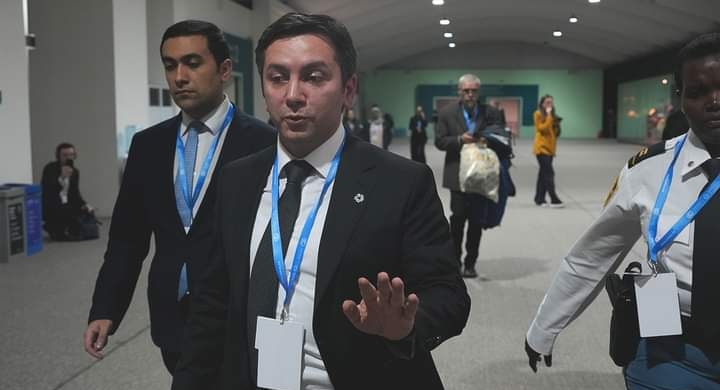By Adeyemi Adekunle
In a unexpected turn of events at the United Nations climate conference (COP29), negotiations have descended into unruly as developing nations vehemently declined a rough draft proposal aimed at securing crucial financial support for climate change adaptation and mitigation initiatives. As the deadline for a consensus loomed, tensions escalated, leaving negotiators scrambling for a way forward amidst a backdrop of growing despair.
With representatives from both rich and poor nations convening in a tense atmosphere marked by urgency, the long-awaited negotiations faltered when the proposed terms of financial assistance fell drastically short of what developing countries deemed necessary.
Key stakeholders from the Least Developed Countries bloc and the Alliance of Small Island States made their frustrations known in a remarkable display of unity, walking out of negotiations in protest over what they labeled an inadequate offer that was insufficient to combat the challenges posed by climate change.
The significance of these talks cannot be overstated. Developing nations argue that an investment of $1.3 trillion is required to address a myriad of climate threats, including increasingly frequent and severe droughts, floods, rising sea levels, and extreme heat. This sum would not only assist in mitigating these threats but would also facilitate a transition away from fossil fuels toward renewable energy systems. The financial discussions themselves are further complicated by the expiration of the existing $100 billion-a-year climate funding agreement, placing greater urgency on this year’s negotiations.
As the clock ticked down towards deadlines, the mood in the main hall of the conference grew increasingly tense. Delegates could be seen huddled in separate groups, discussing alternative strategies while glances of frustration and disbelief were exchanged. When the rough draft of the funding proposal was officially circulated, reports indicate that delegates from multiple nations loudly articulated their discontent, leading to an immediate and passionate backlash.
African representatives were particularly vocal, struggling to understand how the proposed funding could possibly address the stark realities faced by their nations. “This is not merely about numbers on a paper; this is about lives, livelihoods, and the very future of our communities,” cried out one delegate, emphasizing the urgency of actionable support for climate resilience.
As event staff began dismantling the conference infrastructure, the palpable shift from collective discussion to fractionated whispers reflected the growing schism among nations. Negotiators cast glances nervously toward the small huddles forming in hallways—once hopeful discussions giving way to murmured despondency. Various factions debated the possibility of shuttle diplomacy, suggesting further talks might bridge the widening divide, but optimism was quickly giving way to resignation. “We might just be kicking the can down the road to next year,” one negotiator lamented, frustration evident in their voice.
For many developing nations, such summits have become emblematic of a broader struggle to obtain fair and adequate climate financing. In recent years, prior agreements have often fallen short, leaving vulnerable nations to grapple with the costs of climate-related disasters, which they argue have disproportionately been influenced by industrialized nations over decades of greenhouses gas emissions.
The devastating impacts of climate change are not a distant threat for many, but an immediate crisis requiring urgent funding and action. “We are not just negotiating financial aid; we are negotiating our survival,” stated another representative from a small island nation, as looming threats such as rising sea levels render their homelands increasingly untenable.
The Copen agenda, to be postponed until next year, underscores a persistent gap between the aspirations of global leaders and the pressing realities faced by those on the front lines of the climate crisis. Despite vocal pleas for solidarity and collaboration, the prevailing sentiment within the negotiations was one of disillusionment.
As subtle pressures mount, the lack of consensus threatens to fracture diplomatic relationships built over years of shared struggles and aspirations.
As talks drew to a close, Secretary-General of the United Nations, Antonio Guterres, expressed concern over the deteriorating state of the negotiations, emphasizing the need for renewed commitment and action. “We cannot allow mistrust and division to derail the progress we so desperately need. Climate change does not recognize borders; it affects everyone, and it requires a unified response,” he stated in a post-meeting briefing.
The COP29 conference in Baku has become a symbol of the broader fight for climate justice, highlighting the tensions that persist between developed and developing nations. As nations continue to grapple with issues of equity and responsibility, the future of climate financing remains uncertain. Conference participants have officially concluded that further negotiations will be postponed until next year, and while discussions might resume, a lasting solution eludes them.
As representatives prepare to return home, the hope that COP29 would be a turning point in the fight against climate change has been upended. Instead, it serves as a stark reminder of the uphill battle that lies ahead, and the critical need for sustained advocacy to ensure that vulnerable nations receive the support they need to navigate the mounting climate crisis.
In the coming weeks, as communities worldwide start to assess the implications of the failed negotiations, the urgency for action will only grow. Stakeholders will continue to demand accountability from their leaders, pushing for commitments that genuinely reflect the stakes of climate change and an equitable approach to global finance.
The unfolding aftermath of COP29 underscores the growing realization that time is running short. With inequities laid bare, the challenge now lies in transforming outrage into action—because with every passing moment, the impacts of climate change grow more pronounced, and the need for solidarity among nations has never been more critical.



